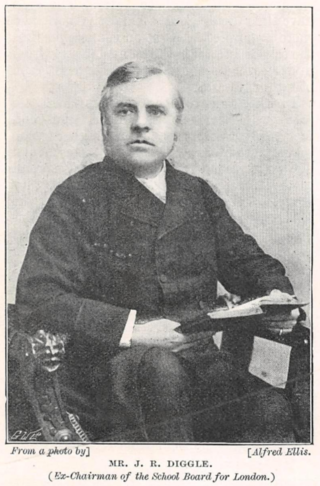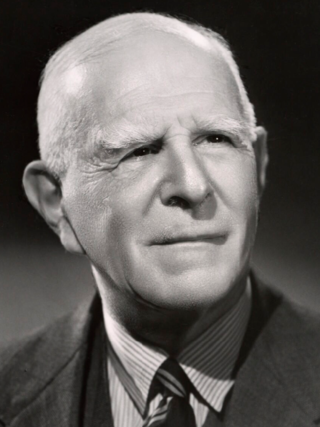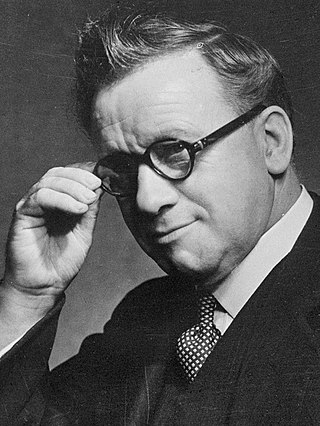
Salford was, from 1844 to 1974, a local government district in the county of Lancashire in the northwest of England, covering the city of Salford. It was granted city status in 1926.

The Reverend Joseph Robert Diggle JP was a British Anglican clergyman, politician and public servant. He is notable for his campaign to change the law to allow clergymen to take seats in the House of Commons, and for his chairmanship of the London School Board. His combative approach to political debate was the key to his career, helping him to run the Board for nine years but denying him any higher office.
Thomas Lorimer Corbett was a British Conservative politician.
An election to the County Council of London took place on 3 March 1898. The council was elected by First Past the Post with each elector having two votes in the two-member seats. The Progressive Party won a substantial majority on the council.
An election to the County Council of London took place on 5 March 1904. The council was elected by First Past the Post with each elector having two votes in the two-member seats. The Progressive Party retained control of the council, with a slightly reduced majority.
An election to the County Council of London took place on 5 March 1925. The council was elected by First Past the Post with each elector having two votes in the two-member seats. The Municipal Reform Party retained a large majority, while the Labour Party established itself as the principal opposition, supplanting the Progressive Party.
Middlesex County Council under the Local Government Act 1888 had to be returned by local elections every three years. Its first election was in January 1889, the year the council first met. The last was in 1961 as the 1964 elections instead were – as to 83 of 87 divisions – for the larger, in-waiting Greater London Council – 4 divisions went into other counties, on abolition. Three intra-war elections were never announced and formally cancelled but otherwise expected in 1916, 1940 and 1943.

Cumberland County Council was the county council of Cumberland in the North West of England, an elected local government body responsible for most local services in the county. It was established in 1889 as a result of the Local Government Act 1888. Carlisle was initially within its area but became a separate county borough in 1914. In 1974, both authorities were merged along with parts of others into the new Cumbria County Council. In April 2023 local government in Cumbria was reorganised into two unitary authorities, one of which is named Cumberland Council and includes most of the historic county, with the exception of Penrith and the surrounding area.

The 1908 Peckham by-election was a parliamentary by-election held for the British House of Commons constituency of Peckham in the Metropolitan Borough of Camberwell, London on 24 March 1908. The seat was won by the opposition Conservative Party candidate, a gain from the Liberal Party who had won a large majority at the 1906 general election.
Sir George Samuel Elliott was a British businessman and politician.

John Lowles was a British businessman and Conservative Party politician.
The second election to the Glamorgan County Council was held on 8 March 1892. The 1889 election was the first contest and the next was the 1895 election. Glamorgan County Council had been established by the 1888 Local Government Act, and the first election held in January 1889. Glamorgan was by far the largest county in Wales in terms of population. The county of Glamorgan was at this time becoming heavily industrialised, although some areas such as the Vale of Glamorgan remained essentially rural. The rise of nonconformist liberalism, especially since the 1860s, throughout Wales, had challenged the prevailing influence of the landed gentry. However, even in 1889, the traditional forces remained influential and no working men were elected to the council. This changed in 1892 with the unopposed return of David Morgan in Aberdare and the success of Isaac Evans in Resolven.
An election to the County Council of London took place on 31 March 1955. The council was elected by First Past the Post with each elector having three votes in the three-member seats. The Conservative Party made significant gains, but the Labour Party retained a substantial majority.

An election to the County Council of London took place on 7 March 1946. The council was elected by First Past the Post with each elector having two votes in the two-member seats. The Labour Party once more made gains, again increasing their majority over the Conservative Party.

An election to the County Council of London took place on 4 March 1937. The council was elected by First Past the Post with each elector having two votes in the two-member seats. The Labour Party made gains, increasing their majority over the Municipal Reform Party.

An election to the County Council of London took place on 8 March 1934. The council was elected by First Past the Post with each elector having two votes in the two-member seats. The Labour Party made large gains from the Municipal Reform Party, and for the first time won control of the council..

An election to the County Council of London took place on 5 March 1931. The council was elected by First Past the Post with each elector having two votes in the two-member seats. The Municipal Reform Party slightly increased its majority on the council, with overall results matching those from 1925.

An election to the County Council of London took place on 8 March 1928. The council was elected by First Past the Post with each elector having two votes in the two-member seats. The Labour Party made slight gains at the expense of the Municipal Reform Party, which nonetheless retained a substantial majority.
The first election to the County Council of London took place on 17 January 1889. The council was elected by First Past the Post with each elector having two votes in the two-member seats. Although the election was not contested on a party political basis, soon after the election, the majority of councillors formed the Progressive Party.
An election to the County Council of London took place on 2 March 1895. The council was elected by First Past the Post with each elector having two votes in the two-member seats. The Moderates made numerous gains, and tied the Progressive Party in seats on the council.









